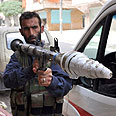
US officials: Al-Qaeda gaining foothold in Syria
Intelligence officials in Washington say radical terror group's grip on war torn country growing; group has hundreds of operatives on the ground
Al-Qaeda has advanced beyond isolated pockets of activity in Syria and now is building a network of well-organized cells, according to US intelligence officials.
Washington fears the terrorists could be on the verge of establishing an Iraq-like foothold that would be hard to defeat if rebels eventually oust President Bashar Assad.
Related stories:
- CIA drone targets al-Qaeda's No. 2 Op-ed: Regional Goliath still deadly
- Iran, al-Qaeda, Taliban told to pay $6B for 9/11
At least a couple of hundred al-Qaeda-linked militants are already operating in Syria, and their ranks are growing as foreign fighters stream into the Arab country daily, current and former US intelligence officials said.
The units are spreading from city to city, with veterans of the Iraq insurgency employing their expertise in bomb-building to carry out more than two dozen attacks so far. Others are using their experience in coordinating small units of fighters in Afghanistan to win new followers.

Fighting in Damascus (Photo: AFP)
In Syria on Friday, rebel commanders appealed anew for new and better weapons from abroad. In fact, rebel leaders said that with so little aid coming to them from the US and other nations, they are slowly losing the battle for influence against hardline militants.
They say their fighters are sometimes siding with extremists who are better funded and armed so they can fight the far stronger Syrian army.
It all could point to a widening danger posed by extremists who have joined rebels fighting the Assad government. US officials fear their presence could fundamentally reshape what began as a protest movement for reform composed of largely moderate or secular Syrians.
The intelligence also offers some explanation for the Obama administration's reluctance to offer military aid to the anti-Assad insurgency, which Washington says it is still trying to better understand.
Underscoring the administration's desire to step up efforts against the Assad government without providing weapons, the US set largely symbolic sanctions Friday on Syria's state-run oil company and Iranian-backed Hezbollah. It accused Iran and the Lebanese Shiite militant group of helping prop up Assad.
Neither action will mean much immediately. Americans have been banned from doing business with Hezbollah since the US declared it a foreign terrorist organization in the 1990s.
As for a possible diplomatic solution, former Algerian foreign affairs minister and longtime UN official Lakhdar Brahimi emerged as a candidate to replace Kofi Annan as peace envoy to Syria.
Annan announced his resignation last week, ending a six-month effort that failed to achieve even a temporary cease-fire as the country descended into civil war.
US officials said the number of al-Qaeda operatives remains small in the context of the larger anti-government insurgency, with perhaps only 200 or so who are active. But ranks are growing, the officials said.
Once operating as disparate, disconnected units, the al-Qaeda cells are now communicating and sometimes cooperating on missions, with a command-and-control structure evolving to match more sophisticated operations in places like Iraq and Afghanistan, US officials said. The coordination is sometimes as good as that of Syria's mainstream rebels.
"There is a larger group of foreign fighters ... who are either in or headed to Syria," the State Department's counterterrorism coordinator, Daniel Benjamin, told reporters recently. He said Syrian opposition groups "assured us that they are being vigilant and want nothing to do with al-Qaeda or with violent extremists."
- Receive Ynetnews updates directly to your desktop










